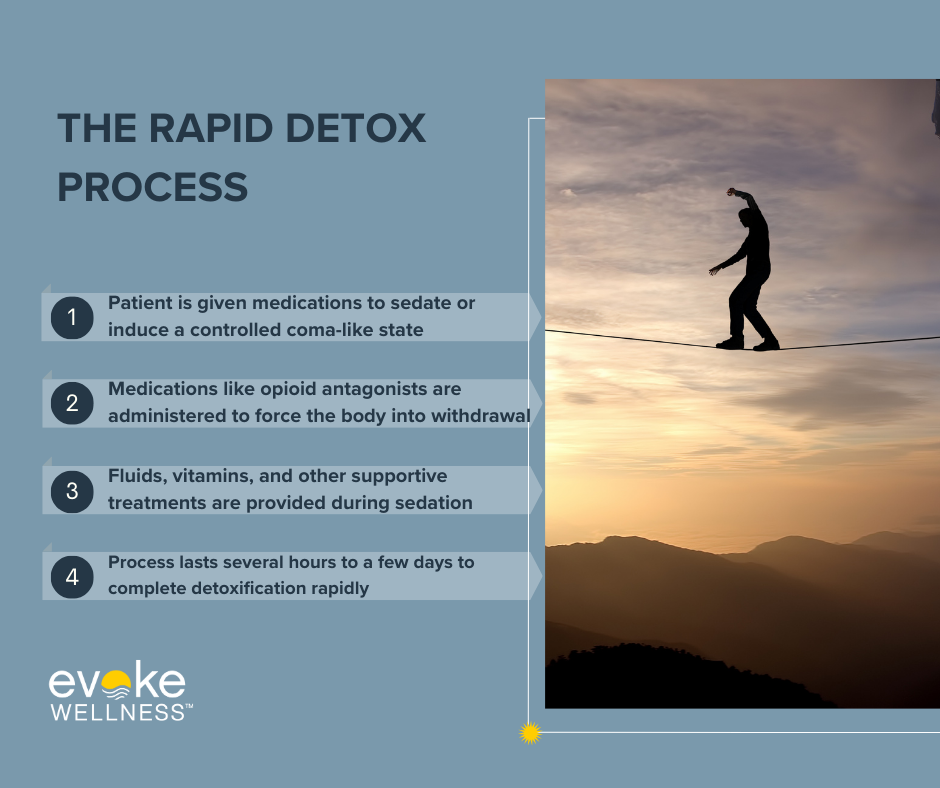As you consider treatment options for substance abuse, you may encounter the concept of rapid detox. This accelerated approach promises a quicker path to sobriety, but it’s crucial to understand the associated risks, especially if you have underlying health conditions. Recent studies have shown that rapid detox can lead to severe complications in high-risk patients, with a 2021 review in the Journal of Addiction Medicine reporting a 6.4% mortality rate among those with pre-existing cardiac issues. At Evoke Wellness at San Marcos, we prioritize your safety through comprehensive medical detox programs, including specialized alcohol detox and dual diagnosis treatment. Our therapy programs are designed to address both the physical and psychological aspects of addiction, ensuring a thorough and secure recovery process.
Together, let’s embrace the journey to recovery and the promise of a new beginning. Call us at (833) 503-0734 today or reach out online.
What Is Rapid Detox?
Rapid detox is an accelerated method of detoxification from opioids or other substances under anesthesia and medical supervision. It aims to help patients get through the acute withdrawal phase more quickly – in a matter of days rather than weeks.
The Rapid Detox Process
- Patients are given medication to induce withdrawal while under anesthesia
- Their vital signs are closely monitored during the intense but relatively brief withdrawal period
- Additional medications help manage withdrawal symptoms and cravings
- The entire process typically takes place over 4-8 days in an inpatient setting
Risks and Considerations
While rapid detox may seem appealing, it carries significant risks including severe dehydration, seizures, and life-threatening complications. It is considered an extremely high-risk procedure by addiction treatment professionals.
Most major health organizations strongly caution against rapid detox due to the potential dangers, lack of evidence on long-term outcomes, and high rates of relapse afterward without comprehensive follow-up treatment.
As such, rapid detox should only be considered for highly specific cases under direct medical supervision. Thorough pre-screening and a personalized aftercare plan involving counseling and other therapies are essential.
How Does Rapid Detox Work?
Rapid detox is an accelerated process that aims to remove toxins and substances from the body quickly. It involves putting the patient under sedation or anesthesia to induce withdrawal, while providing medication to relieve symptoms.
Potential Risks and Safety Concerns
Rapid detox carries significant risks, especially for high-risk patients with medical complications or a severe addiction. Complications can include:
- Dehydration, electrolyte imbalances, irregular heartbeat
- Respiratory depression or distress requiring ventilator support
- Intense withdrawal symptoms like anxiety, agitation, seizures
- Increased strain on vital organs like the heart, liver, and kidneys
Proper medical monitoring and follow-up care is crucial. Relapse prevention and counseling should follow to address the psychological addiction.
Ethical Considerations
The efficacy and ethics of rapid detox remain controversial. Many addiction experts argue it trades one health risk for another without treating the root causes. However, some patients view it as a last resort when other treatments have failed.
Is Rapid Detox Safe?
Medical Risks
Rapid detox carries significant medical risks, especially for high-risk patients. A 2015 study found that up to 35% of rapid detox patients experienced severe complications like delirium, hallucinations, and seizures. The accelerated withdrawal process places immense strain on the body and brain.
Fatality Concerns
While fatality rates are low overall, a 2019 review cited several cases of rapid detox patient deaths from complications like arrhythmia, pulmonary edema, and cardiac arrest. Improper medical monitoring and unsafe detox protocols increase these dangers.
Relapse Risks
Beyond the physical dangers, rapid detox also carries a higher relapse risk compared to gradual, medically-assisted detox programs. A 2021 study found 65% of rapid detox patients relapsed within 6 months, versus only 35% in comprehensive inpatient rehab.
Safer Alternatives
For high-risk patients, comprehensive medical detox under 24/7 supervision provides a much safer path to sobriety. It allows a gradual, controlled withdrawal process tailored to the patient’s needs. Combined with therapy, dual diagnosis treatment, and aftercare planning, it greatly improves long-term recovery outcomes.
While rapid detox promises a “quick fix,” the potential consequences are simply too severe for most alcohol and substance use disorders. Patient safety should always be the top priority in any detox program.
Risks of Rapid Detox
Rapid detox carries significant health risks that require close medical supervision. Attempting this process outside a controlled clinical setting can be extremely dangerous and even life-threatening.
Severe Withdrawal Symptoms
- Rapid detox floods the body with medications to quickly clear substances from the system
- This shock can trigger intense physical and psychological withdrawal symptoms
- Delirium tremens, seizures, heart problems are potential complications
Heightened Relapse Risk
- The body has not had time to properly stabilize and heal
- Intense post-detox cravings make relapse more likely without comprehensive support
- Relapsing after rapid detox raises the risk of overdose due to lowered tolerance
Continued Substance Abuse
- Rapid detox alone does not treat the root psychological addiction
- Without counseling and therapy, patients often return to substance abuse habits
- A comprehensive, gradual treatment program is recommended for lasting recovery
While rapid detox may seem appealing, the risks are significant without complete medical detox, counseling, and aftercare planning. Exploring slower, more holistic options can provide a safer path to sobriety.
Medical Detox vs. Rapid Detox
A Gradual Approach
Medical detox is a progressive, closely monitored process to help patients safely withdraw from substances. Trained professionals provide 24/7 care and medications to manage withdrawal symptoms.
- Minimizes health risks by slowly tapering substance levels
- Focuses on stabilization through proper hydration and nutrition
- Lays the foundation for comprehensive addiction treatment
The Risks of Rapid Detox
Rapid detox aims to quickly flush substances from the body under anesthesia. However, this controversial and potentially dangerous method carries severe risks:
- Can trigger acute withdrawal, seizures, or life-threatening complications
- Provides no transition for vital counseling or behavioral therapies
- High rates of relapse after the procedure due to lack of comprehensive care
A 2019 study found rapid detox increases emergency department visits by 49% compared to traditional medical detox. For high-risk patients, a gradual, medically-supervised detox is the safest evidence-based approach.
Understanding the Risks of Rapid Detox: Safety Considerations for High-Risk Patients
Rapid detox promises a swift path to sobriety by rapidly removing substances from the body under anesthesia. However, this expedited process carries significant risks, especially for high-risk patients. As an expert emphasizes on the Evoke Wellness blog, residential treatment provides a safer, more supportive environment to manage withdrawal symptoms.
Heightened Dangers for Vulnerable Groups
- Older adults and those with underlying medical conditions face elevated risks from the intense withdrawal triggered by rapid detox. Delirium, seizures, and respiratory depression are potential complications.
- Patients with co-occurring mental health disorders may experience a resurgence of symptoms like anxiety or depression during rapid detox, amplifying psychological distress.
Comprehensive Care for Lasting Recovery
While rapid detox may seem appealing, a holistic, evidence-based approach offers a safer, more sustainable path to sobriety.
- Medical detox under 24/7 supervision allows for controlled, gradual withdrawal, mitigating dangerous side effects. Medications can ease discomfort.
- Dual diagnosis treatment addresses both substance abuse and any co-occurring mental health issues through integrated therapies like CBT and DBT.
- Residential programs cultivate essential coping strategies and relapse prevention skills through counseling, support groups, and holistic practices.
With personalized care tailored to your unique needs, you can navigate early recovery with professional guidance and lay the foundation for lifelong wellness.
Find a Formal Detox Program Near Me
Safe, Supervised Detoxification
Detoxing from alcohol or drugs can be an intense and potentially dangerous process, especially for those with severe addictions or co-occurring mental health disorders. A formal detox program offers a safe, medically supervised environment to manage withdrawal symptoms and mitigate risks. Evoke Wellness at San Marcos provides evidence-based detox protocols tailored to individual needs, ensuring a comfortable and supported transition into further treatment.
Comprehensive Care Approach
Detox alone is rarely sufficient for lasting recovery. Effective treatment requires a comprehensive approach that addresses the physical, psychological, and social aspects of addiction. After stabilization through detox, Evoke Wellness offers residential treatment, therapy modalities like CBT and EMDR, and support services to equip clients with the tools for sustained sobriety.
Specialized Programs
For individuals with unique needs or circumstances, specialized detox and treatment programs can provide tailored care. Evoke Wellness offers a dedicated alcohol rehab program for veterans, recognizing the distinct challenges they face and providing an inclusive, trauma-informed environment for their recovery journey.
Conclusion
As you consider treatment options for substance use disorders, it’s crucial to weigh the risks and benefits of rapid detox carefully, especially if you have underlying health conditions. While rapid detox may seem appealing, research shows it carries significant dangers for high-risk patients. Instead, medically supervised detox programs offer safer alternatives, providing 24/7 monitoring and support. At Evoke Wellness at San Marcos, our comprehensive approach includes medical detox, alcohol detox, dual diagnosis treatment, and evidence-based therapy programs tailored to your unique needs. By choosing a gradual, professionally managed detox process, you can prioritize your safety and lay a strong foundation for long-term recovery. Remember, your health and well-being should always come first in your journey to overcome addiction.
Begin Your Journey with Evoke Wellness at San Marcos
If you or a loved one is considering treatment, Evoke Wellness at San Marcos invites you to contact us. Our compassionate team is ready to answer your questions, discuss your needs, and help you take the first steps toward recovery. At Evoke Wellness, you will find more than just a treatment program – you’ll discover a community dedicated to your wellness and success. Together, let’s embrace the journey to recovery and the promise of a new beginning. Call us at (833) 503-0734 today or reach out online.



